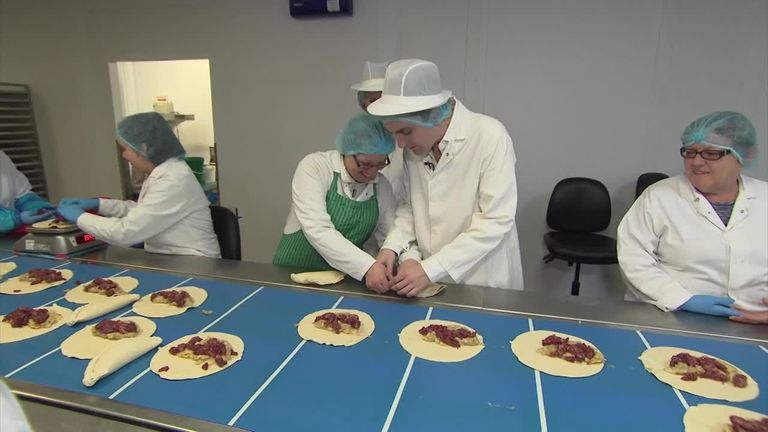Lewis Lorry: Is Brexit going to stitch up the UK's textile trade?
The Lewis Lorry heads to Salford, where one textile company relies on EU workers because skilled Britons are hard to find.
Wednesday 12 April 2017 07:50, UK
The phrase "rich seam" could well have been invented for Brexit. As far as most journalists are concerned (in story terms at least) it's the gift which keeps on giving.
And so where better for the next stage of the Lewis Lorry tour but Salford. Pedants will tell you that the city is in Greater Manchester - but as any good history student will tell you, it really lies in Lancashire where cotton was king.
From Blackburn to Burnley and back again, the landscape was punctuated by spinning jennies, looms and mills. They have long since turned to dust, but textiles manufacture is still part of the warp and weft of this part of England.
Still churning out clothing are the scores of workers at the premises of Private White V.C. - a family business which has been weaving, sewing and stitching for nearly a century on the same site.
They're part of an industry that far from moribund today generates £4.5bn of exports a year, about 3% of everything our country manufactures.
We use the lorry to give Kaisa an early doors start to work. She's one of the tens of thousands employed in the industry who are EU nationals. A Pole who has been in the UK for 10 years (and with a pretty broad Mancunian accent to boot), she's in the process of applying for British citizenship but says many of her workmates are worried.
"It's scary when you look at the countdown and think there's less than two years to do everything we can as a business to support everyone and help them with the paperwork and bureaucracy but I already know it's got harder to recruit," she said. "People are just too uncertain about the future."
At Private White, about 35% of the whole workforce are EU migrants. They hail from right across the continent - especially from countries in the European south such as Portugal, Italy and Romania, where the skills around textiles manufacturing are most commonly found.
And this, as the company's chief executive James Eden tells me, this is the reason why it is difficult to replace European workers with British ones - no matter how much he might like to.
He explained: "We just don't have those skills any more. This is detailed, technical stuff and not easy. We've not had those skills pretty much since the late 1980s - our technical education system just doesn't provide it. So we have no choice but to look for them elsewhere."
So one solution would be to just rebuild that system - sounds simple enough. But I've personally lost count of the number of times politicians from governments of every colour have pledged to transform the technical education of this country and yet it never seems to happen.
If we couldn't do it before, the chances of devising, building and consolidating a new system while most of Whitehall is consumed by negotiating a Brexit deal seem remote.
And even if we could, there would be a significant lag-time between that system bearing fruit in the form of skilled workers and them being able to take up work, so something - some people - would have to plug the gap.
And yet Private White V.C. is exactly the sort of place that Theresa May needs to succeed as part of her plan to build a "global Britain".
They're producing a high-quality, premium product that is able to sell abroad at a price partly because of its "Made in Britain" pedigree.
A coat here could set you back £650 and export all over the world, especially in the rest of the EU.
This is all part of the delicate tapestry the PM is herself weaving: she has to satisfy the public she's reduced immigration whilst making sure companies like this have someone on hand to sew.
If she can't make a decent hash of doing both, never mind a stitch in time saving nine, it'll be her who needs saving.






